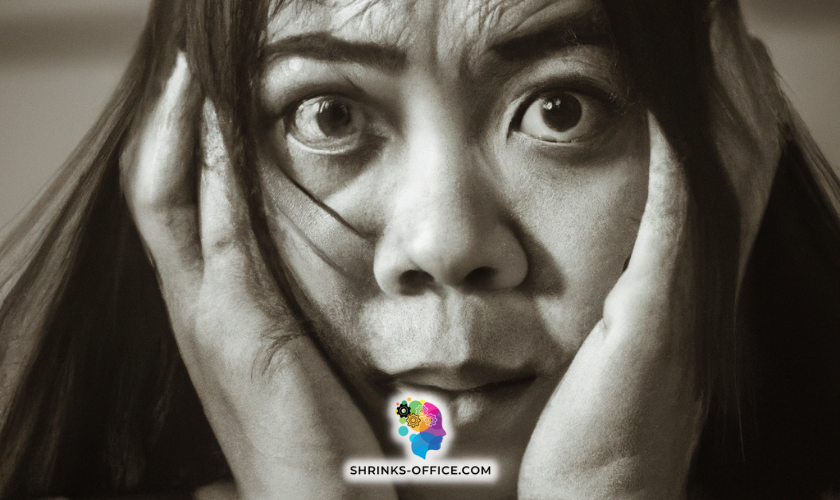Hormones That Cause Anxiety - Understanding and Managing Hormonal Imbalances
- Cortisol: The Stress Hormone
- Adrenaline: The Fight or Flight Hormone
- Thyroid Hormones: T3 and T4
- Sex Hormones: Estrogen, Progesterone, and Testosterone
- Oxytocin
- Serotonin
Have you ever experienced heightened anxiety or even panic attacks and wondered if hormones could be the culprit? Hormonal imbalances can indeed trigger anxiety disorders, and it's important to understand how hormones affect anxiety and mental and physical health. In this article, we'll explore the hormones that can cause anxiety and hormonal imbalances and how to manage them.
Hormones that Contribute to Anxiety
Cortisol: The Stress Hormone
Cortisol is a well-known hormone that has been firmly linked to anxiety disorder. Produced by the adrenal gland in response to stress, cortisol serves an important purpose; however, too much of this hormone can lead to increased levels of anxiousness. Research indicates that those with anxiety disorders tend to have higher concentrations of cortisol compared with individuals who are not diagnosed with such ailments.[1]
Helpful tip
Making friends when you have social anxiety? Start small by joining supportive groups or engaging in hobbies you enjoy. Take it at your own pace and be kind to yourself.
Adrenaline: The Fight or Flight Hormone

Adrenaline is another vital hormone released by the adrenal gland during stressful events. While it plays a crucial role in keeping us safe and alive, overwhelming amounts can be detrimental - resulting in physical symptoms like rapid heartbeat, chest pain, perspiration, trembling or shaking body parts, and difficulty breathing, as reported by Ohio State University. Moreover, it may also induce feelings of fear or panic.[2] In this case, you might need to see a doctor as it may be an adrenal tumor called pheochromocytoma.
Thyroid Hormones: T3 and T4
The thyroid gland produces hormones called T3, T4, and THS, which play a critical role in regulating metabolism. According to PubMed, there is a mutual relationship between thyroid hormone levels and anxiety [3]. An underactive and/or overactive thyroid gland can trigger anxiety symptoms, such as heightened anxiety, nervousness, and weight gain or weight loss.
Sex Hormones: Estrogen, Progesterone, and Testosterone
Sex hormones also play a vital role in our hormonal balance, and imbalances in sex hormones can contribute to anxiety disorders. According to studies, fluctuations of estrogen, progesterone, or testosterone can cause symptoms such as anxiety, depression, mood swings, and low libido both in women and men [4]. Hormonal fluctuations during the menstrual cycle (periods) or menopause can also trigger hormonal changes that affect mood and lead to anxiety.
Oxytocin
Oxytocin is a hormone that's often referred to as the "love hormone" or "cuddle hormone." It's produced by the hypothalamus and released during physical contact, such as hugs or sex. Oxytocin has been shown to reduce stress, anxiety, and depression[5]. Conversely, low levels of oxytocin have been linked to increases in anxiety[6].
Interesting tip
Curious about the journey of anxiety recovery? Explore the 6 anxiety recovery stages: awareness, acceptance, education, self-care, coping skills, and growth.
Serotonin
Serotonin is a vital neurotransmitter that helps keep our mood, sleep, and appetite in balance. It's often referred to as the "happiness hormone," with lower levels being linked to anxiety and depression. [7]. Increasing serotonin levels can boost mood, reduce anxiety and improve sleep patterns.
The Inflammation Hormone: Cytokines
Cytokines are a diverse group of proteins produced by cells of the immune system, including white blood cells, macrophages, and lymphocytes. They function as messengers, relaying signals between cells to regulate immune responses, inflammation, and other physiological processes. Cytokines can be pro-inflammatory or anti-inflammatory, depending on the specific type and context in which they are released. [8]
How Hormonal Imbalance Can Lead to Anxiety

Hormone imbalance can disrupt the delicate balance of our body's systems, including our mood and emotions. For example, imbalances in stress hormones such as cortisol and adrenaline can trigger the "fight or flight" response, causing anxiety symptoms. Similarly, imbalances in thyroid hormones can disrupt the body's metabolism, leading to anxiety symptoms. In women, imbalances in estrogen levels can cause changes in mood and emotions, leading to anxiety symptoms.
When these imbalances occur for a longer period of time, anxiety can become chronic. Fortunately, hormonal imbalance can be managed with lifestyle changes and/or hormone replacement therapies.
Important
Dealing with intrusive thoughts and anxiety? Remember, thoughts are not facts. Practice mindfulness, challenge your thoughts, and seek support when needed.

Stress: Understanding Its Impact on Hormonal Balance and Anxiety
Stress is a natural response to challenging or threatening situations. When faced with stressors, the body releases hormones that prepare us to either fight or flee from the perceived danger.
However, chronic stress, which occurs when stressors are persistent or long-term, can have detrimental effects on hormonal balance and contribute to anxiety. This section explores the impact of chronic stress on hormones and provides effective stress management techniques to reduce anxiety.
Chronic Stress: A Disruptor of Hormonal Balance
Chronic stress can disrupt the delicate balance of hormones in the body, leading to dysregulation and increased anxiety levels. Here are some key ways chronic stress impacts hormonal balance:
- Cortisol: The Stress Hormone
- Chronic stress triggers the prolonged release of cortisol, commonly known as the stress hormone.
- Excessive cortisol production can disrupt the functioning of other hormones, such as sex hormones and thyroid hormones.
- Cortisol dysregulation can contribute to anxiety, depression, sleep disturbances, and impaired immune function.
- Adrenaline (Epinephrine): The Fight-or-Flight Hormone
- Chronic stress can lead to an overactive release of adrenaline, preparing the body for immediate action.
- Elevated adrenaline levels can cause increased heart rate, rapid breathing, and heightened anxiety symptoms.
- Sex Hormones: Estrogen, Progesterone, and Testosterone
- Chronic stress can disrupt the balance of sex hormones, leading to hormonal imbalances and associated mood changes.
- In women, imbalances in estrogen and progesterone levels can contribute to anxiety and mood swings.
- In men, chronic stress may result in decreased testosterone levels, potentially leading to anxiety and irritability.
- Thyroid Hormones: Regulators of Mood and Metabolism
- Chronic stress can impair the functioning of the thyroid gland, leading to thyroid hormone imbalances.
- Thyroid dysfunction can cause symptoms such as fatigue, depression, irritability, and increased susceptibility to anxiety.
Effective Stress Management Techniques to Reduce Anxiety
Managing stress effectively is crucial for restoring hormonal balance and reducing anxiety. Here are some proven techniques to help manage stress and promote emotional well-being:
- Mindfulness and Meditation
- Practice mindfulness meditation to cultivate present-moment awareness and reduce stress reactivity.
- Incorporate deep breathing exercises to promote relaxation and alleviate anxiety symptoms.
- Physical Exercise
- Engage in regular physical exercise, such as walking, jogging, or yoga, to release endorphins and reduce stress hormones.
- Aim for at least 30 minutes of moderate-intensity exercise most days of the week.
- Healthy Lifestyle Habits
- Prioritize sufficient sleep to support hormonal balance and overall well-being.
- Maintain a balanced diet rich in whole foods, fruits, vegetables, and lean proteins.
- Limit caffeine and alcohol consumption, as they can exacerbate anxiety symptoms.
- Social Support and Connection
- Seek support from friends, family, or support groups to share concerns and alleviate stress.
- Engage in activities that foster social connection, such as spending quality time with loved ones or participating in group activities.
- Time Management and Prioritization
- Organize tasks and responsibilities to avoid feeling overwhelmed.
- Set realistic goals and break them down into smaller, manageable steps.
- Practice effective time management techniques, such as prioritizing tasks and delegating when necessary. [9]
Managing Hormone Imbalances and Anxiety

Lifestyle Changes
Lifestyle changes such as daily exercise, stress management, a healthy diet, and adequate sleep can help regulate hormone levels and reduce anxiety symptoms. Foods rich in fiber and fermented foods can also help reduce feelings of anxiety and promote a healthy gut, which is linked to hormonal balance.
Medical Treatments
Medical treatments such as hormone replacement therapy, antidepressants, and anti-anxiety medications can help treat hormonal imbalances and alleviate anxiety symptoms. However, it is essential to consult a healthcare expert to identify the most suitable treatment plan for one's individual needs.
Therapy
Cognitive Behavioral Therapy (CBT), Mindfulness-Based Stress Reduction (MBSR), and other forms of psychotherapy can assist in recognizing triggers that cause anxiety while teaching individuals how to better manage their stress levels. These therapies enable people to gain control over their emotions, lessen feelings of nervousness, as well as motivate them to make positive lifestyle modifications which will benefit long-term health outcomes. For those who feel uneasy meeting with a therapist in person, virtual therapy sessions are available through online platforms too.
Conclusion
In conclusion, hormonal imbalances can contribute to anxiety disorders. Understanding the link between hormones and anxiety can help us better manage our mental health. By making lifestyle changes and seeking medical treatment when necessary, we can regulate our hormones and reduce anxiety symptoms. If you're facing anxiety symptoms, it's essential to check with your healthcare provider to discover the root cause and decide on the most suitable treatment plan for your hormonal-induced anxiety. Additionally, you can test yourself with our online tool "Anxiety Test" to confirm if you suffer from Anxiety disorder.
FAQ
Can hormone imbalance cause severe anxiety?
Yes, a hormone imbalance can cause severe anxiety. This is especially true if the imbalance is left untreated. If you're feeling anxious, it's essential to discuss your symptoms with a medical professional, so they can help identify what is causing the anxiety and suggest an appropriate course of treatment.
What is the biggest stress hormone?
The biggest stress hormone is cortisol, also known as the "stress hormone." When we experience pressures or anxieties, cortisol is released into our bloodstream. It's essential to maintain an adequate level of this particular hormone since too much can lead to severe health issues like depression, insomnia, and diabetes. Additionally, it could even elevate one's risk of heart disease.
References
- Salivary cortisol levels in persons with and without different anxiety disorders - PubMed
- Excess Adrenaline Symptoms & Treatment | OSUCCC – James
- Relationship between anxiety and thyroid function in patients with panic disorder - PubMed
- Associations Between Anxiety, Body Mass Index, and Sex Hormones in Women - PMC
- Roles of Oxytocin in Stress Responses, Allostasis, and Resilience - PMC
- Oxytocin Levels in Social Anxiety Disorder - PMC
- Anxiety is associated with reduced central serotonin transporter availability in unmedicated patients with unipolar major depression: a [11C]DASB PET study - PubMed
- Pubmed: Cytokine production capacity in depression and anxiety
- Research Gate: Neurobiological links between stress and anxiety
